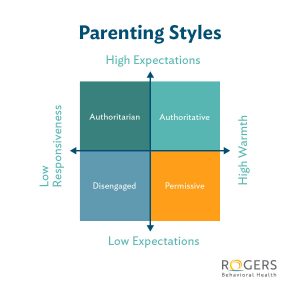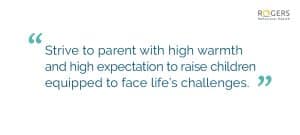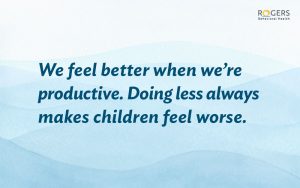Parenting is one of life’s greatest privileges and responsibilities. Have you ever wondered how your parenting style is contributing to your child’s development and future success? How we parent doesn’t just shape their behavior. It can also affect how they handle relationships, navigate challenges, and see themselves and the world. Understanding your style can be the first step toward a healthier family.
In this third installment of our blog series, Family Foundations: How to Build a Stronger, Healthier Home, Dr. Peggy Scallon, MD, DFAPA, DFAACAP, psychiatrist, chief medical officer of Rogers Behavioral Health in Oconomowoc and medical director of Focus Depression Recovery Adolescent Residential Care at Rogers in Oconomowoc discusses the four parenting styles and their impact on children’s development.
What are the four parenting styles?
 Based on work by developmental psychologist, Diane Baumrind, PhD, researchers have identified four common parenting styles:
Based on work by developmental psychologist, Diane Baumrind, PhD, researchers have identified four common parenting styles:
- Authoritative
- Authoritarian
- Permissive
- Uninvolved
Parents should keep in mind that most of the time, they’ll want to guide their children toward healthy adulthood by maintaining high warmth and high expectations. They should strive to have warm, close relationships with their children while holding them accountable for gaining the skills they need. Parents are the most important teachers their children will have.
What is the authoritative style and how does it impact kids?
Authoritative parents generally:
- Communicate well with their children.
- Have clear rules and consequences.
- Recognize that upholding expectations is difficult at times, like setting limits on screen use, which is important, though often not popular.
- Don’t feel the need to always be “liked” by their child.
- Validate a child’s feelings while also making it clear the adults are in charge.
- Show warmth and affection.
- Use positive discipline strategies, like praise and reward systems, to reinforce good behavior.
- Prioritize and enjoy spending time with the family. Pursue interests together.
Children of authoritative parents generally:
- Feel loved and supported.
- Have a sense of belonging.
- Understand that they may make mistakes.
- Are held responsible and accountable for their actions, like managing their responsibilities.
- Are more confident and happier.
- Have better social skills.
- Tend to have higher academic achievement.
- Are more self-reliant.
What is the authoritarian style and how does it impact kids?
Authoritarian parents generally:
- Exert control through yelling, coercion, and criticism.
- Stress and demand obedience above everything.
- Have unclear and inconsistent rules.
- Give harsh and arbitrary consequences.
- Don’t make their child a priority.
- Don’t engage in positive activities with their child or make them a priority.
Children of authoritarian parents generally:
- Comply out of fear.
- Are afraid to make mistakes because of hard punishment or criticism.
- Don’t turn to their parents for guidance when something goes wrong.
- Often feel angry.
- Haven’t internalized a sense of being loved and valued.
- Tend to be more distant and rebellious because they haven’t banked positive experiences or memories.
- Have low self-esteem.
- Don’t have their own sense of right and wrong.
- Act out when they leave home. They haven’t had to make many decisions on how to navigate life because their decisions were made for them.
What is the permissive style and how does it impact kids?
Permissive parents generally:
- Set rules but don’t consistently enforce them.
- Rarely step in to redirect the child’s behavior unless there’s a serious problem.
- Believe their kids can do no wrong.
- Adopt more of a friend than a parent role.
- Shield their kids from the consequences of their actions.
- Undermine other authority figures, such as school staff.
- Don’t put much effort into discouraging poor choices or bad behavior. This is high warmth and low expectations.
- Don’t set limits on screen use.
Children of permissive parents generally:
- Hold a lot of power, expecting that parents will get them out of jams.
- Could be described as entitled.
- Often end up feeling angry and frustrated because they’re navigating a world where their expectations don’t match what is happening to them.
- Struggle with managing their emotions.
- Tend to be more anxious.
- Are less socially successful, which ultimately leads to low self-esteem and unhappiness.
This might be okay for grandparents who see kids occasionally and enjoy spoiling them with an ice cream cone too close to dinner, but for parents or caretakers, it’s not recommended to set up your child to think they can do what they want and will not be held accountable.
What is the uninvolved parenting style and how does it impact kids?
Uninvolved parents generally:
- Tend to have little knowledge of what or how their kids are doing.
- Don’t give much in the way of guidance, nurturing, or attention.
- Are minimally engaged.
- Don’t set rules or enforce them.
Children of uninvolved parents generally:
- Feel “empty.”
- Have low-self-esteem.
- Struggle academically and socially.
- Are unsure they they’re loved or cared for.
- Don’t know how to solve problems or make decisions.
What is the recommended style and why?
Researchers say while parents occasionally demonstrate traits from each style, they should strive toward the goal of consistently parenting with high warmth and high expectations with the goal of raising happier, healthier children who are equipped to face real-world challenges. 
Experts consider authoritative parenting to be the most developmentally healthy and effective parenting style. Research has found kids who have authoritative parents are most likely to become confident, responsible adults who feel comfortable self-advocating and expressing their opinions and feelings.
What about when kids have mental health challenges?
Parents who have kids with mental health challenges can sometimes think, “They’re suffering. Maybe I should drop the expectations and let them be.” But we know that when people are not productive and or active, they feel worse.
It’s normal for parents to want to shield their child from discomfort or accommodate them in some way, but we should always support and maintain the expectation that they function at an age-appropriate level. Sometimes professional help is needed when this gets off track and kids start falling behind. In the post-COVID world, this is proving to be a more common problem. Children and teens became more isolated, and expectations were unclear for important years of their development. More than ever, it’s important to help kids get back on track to gain skills necessary for adulthood.
 We use behavioral activation in treatment which teaches that we feel better when we’re productive, accountable, physically active, responsible, and have successful relationships. Being active and engaged improves mood, and we shouldn’t drop expectations when children are depressed or anxious. In fact, doing less, not meeting responsibilities, and becoming more isolated always makes children feel worse. As always, if this is hard to navigate, please seek professional help.
We use behavioral activation in treatment which teaches that we feel better when we’re productive, accountable, physically active, responsible, and have successful relationships. Being active and engaged improves mood, and we shouldn’t drop expectations when children are depressed or anxious. In fact, doing less, not meeting responsibilities, and becoming more isolated always makes children feel worse. As always, if this is hard to navigate, please seek professional help.
Rogers offers mental health treatment
Our compassionate teams help children, teens, and adults find the path to recovery so they can live full, connected lives.
Call 833-308-5887 for a free, confidential screening.

Part of our summer series, Sunny Days, Healthy Minds
Summer is right around the corner, and there’s never been a better time to prioritize mental health! Rogers is proud to introduce you to eight new offerings designed to fit busy summer schedules and address a variety of mental health concerns – without interfering with vacations and other beloved summer activities. Click here to learn more.



